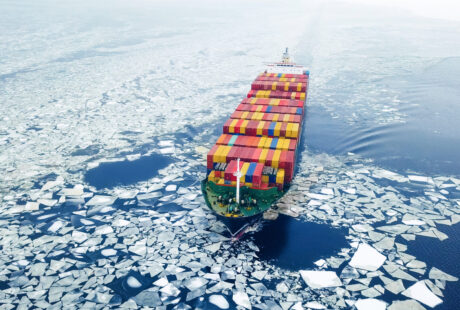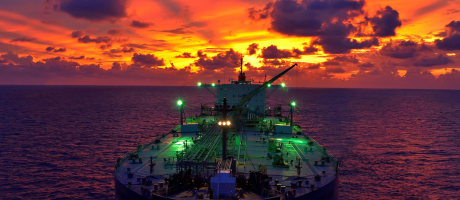In October 2025, the International Maritime Organization’s (IMO) extraordinary session of the Marine Environment Protection Committee (MEPC ES.2) convened specifically to adopt the Net Zero Framework (NZF), a policy package already approved by IMO Member States at the regular MEPC session this past spring.
What should have been a week of discussion between delegates, ending with a vote to adopt the framework turned out to be a week of delaying tactics from a select few, finishing with a vote to I adjourn the meeting for one year, effectively postponing the adoption of the Framework until 2026. A further casualty of the vote to adjourn was the adoption of some other amendments to MARPOL Annex VI, including a new North Atlantic emission control area designed to reduce air pollution from ships in waters from the Straits of Gibraltar to Greenland.
A Vote That Halted Momentum
The session was meant to mark the culmination of years of work on the IMO’s long-term decarbonisation architecture for shipping.
The United States had, throughout the lead-up to the meeting, lobbied extensively against adoption, including through direct outreach to national capitals and to individuals. When it became clear mid-week that the votes were not aligned with its position, the U.S. delegation focused on procedural tactics that contributed to delaying progress.
After several days of procedural interventions and diplomatic pressure, in a turn of events, Saudi Arabia called for a roll-call vote to adjourn the meeting for twelve months.
This came right after Brazil had requested a vote on the adoption of the Framework itself. Following some confusion in the room, the IMO’s legal department clarified that under the Organization’s rules of procedure, a procedural vote takes precedence over a substantive one, i.e. rules and order of business win over content or voting on a bill.
As a result, the adjournment motion was voted on first and passed before the adoption could even be considered.
It is important to note that countries voting in favour of adjournment or abstaining were not necessarily opposed to the adoption of the Framework itself. In several cases, the positions were influenced by political or economic pressure, or by uncertainty about the procedural consequences of each vote.
At the same time, the European Union’s initially unified front fractured, with Member States Greece and Cyprus abstaining, ultimately leading to the breakdown of the coalition for adoption.
Consequences of the Adjournment
The one-year delay means that all the dates and milestones referenced in the Net Zero Framework will now have to be pushed back and revised. This means another setback in cleaning up shipping and reducing its climate impact as it is now unlikely that shipping can reach its own 2030 target.
It also means that politically, procedural obstruction can override substantive agreement, a worrying precedent for the multilateral process.
For the private sector, it introduces significant uncertainty due to both the delay of the meeting but also in not knowing if the Net Zero Framework will indeed be adopted when back in session. This comes at a time when clear direction is urgently needed. Without a firm IMO signal, companies that still want to go ahead with decarbonising their fleet are likely to focus on transitional fuels such as biofuels and LNG rather than invest in large-scale zero-emission alternatives such as e-methanol.
Technical Work and the Multiplier Debate
Following the adjournment, the IMO’s Intersessional Working Group on Greenhouse Gases (ISWG-GHG 20) continued its work on the technical Guidelines that will eventually underpin the NZF. Discussions advanced on the Greenhouse Gas Fuel Intensity (GFI) system, the design of a global fund, and the development of a Life-Cycle Assessment (LCA) methodology for calculating fuel emissions.
A particularly important topic now emerging is the possible introduction of multipliers in the GFI formula.
Multipliers grant additional compliance credit to hybrid ships using zero-emission fuels or partly using zero emission fuels, for instance counting each tonne of e-fuel as two tonnes of compliant fuel for a limited period. The concept is intended to accelerate early investment in e-fuels and hydrogen by making them temporarily more competitive with fossil fuels.
However, it also has implications for fund revenues since more vessels would meet their targets artificially and therefore pay fewer contributions in the short term. To address this, several stakeholders have suggested that time-limited multipliers, such as the ten-year window proposed in the Clean Shipping Coalition submission (Clean Shipping Coalition | ISWG-GHG 20/2/31: Amplifying the policy signal for the production and uptake of e-fuels through the IMO Net-Zero Framework Guidelines – Clean Shipping Coalition), could balance ambition and equity.
A decade of enhanced crediting could provide a strong investment signal for both fuel producers and ship operators to switch fuels early, while ensuring that once the period ends, the system reverts to normal accounting and full contributions to the fund.
In parallel, early protests have begun to emerge in parts of North Africa and Latin America around new hydrogen production projects, with civil society groups warning of extractivist or neocolonial models. While project structures vary widely, these developments underline the responsibility for countries to ensure that the global energy transition does not reproduce old inequalities, even as the shift toward zero-emission fuels becomes essential for climate goals.
Biofuels and Broader Equity Challenges
Meanwhile, a growing number of governments in Southeast Asia, Latin America, and parts of Africa view biofuels as a means to capture economic opportunity within the energy transition.
Seas At Risk, as a member of the Clean Shipping Coalition, continues to caution that crop- and feed-based biofuels are not a sustainable solution given their environmental and social impacts.
Both debates on multipliers and biofuels show that shipping’s next phase of decarbonisation will take place in complex terrain, where equity, economic development, and emission reductions do not always align.
Navigating these trade-offs will require open, informed dialogue and a renewed commitment to fairness in the global transition.
The Way Forward
Seas At Risk will remain actively engaged in the IMO process and in coalition efforts to:
- Maintain ambition and coherence in the development of the Net Zero Framework Guidelines,
- Advocate for a clear hierarchy of action in shipping decarbonisation:
- First, improving the energy efficiency of ships and operations to reduce overall energy demand through: hull cleaning, speed reduction, route optimization, etc.
- Second, scaling up wind and wind-assisted propulsion across the global fleet as a direct and proven means of zero-emission power.
- And third, ensuring that sustainable, genuinely zero-emission fuels are reserved for the share of maritime energy demand that cannot be met through efficiency and wind.
- Promote a just and equitable global transition for the maritime sector,
- Ensure an all-encompassing and coherent reduction of shipping’s impact on our oceans, planet and lives such as urgently reducing emissions of super-pollutants black carbon and methane, and reducing underwater radiated noise
The adjournment represents a setback but also a reminder of how crucial sustained engagement and coalition-building will be in the year ahead.
Posted on: 31 October 2025



